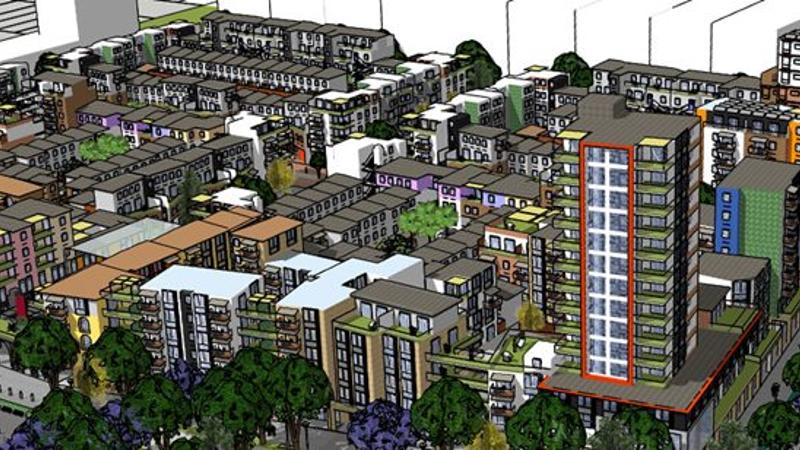Industrialised Construction and Design Management
MSc
Full time: 12 months (Sept start), 17 months (Jan start - including summer break)
Part time: Part time/distance learning: 24 months (Sept start), 29 months (Jan start - including summer break)
Location: Headington
School(s): School of the Built Environment
Overview
The MSc Industrialised Construction and Design Management programme embraces environmentally sustainable and efficient construction practices to solve the most pertinent problems faced by the construction industry.
The construction industry is rapidly changing; new technologies, innovative methods, global challenges and increased demand have accelerated a new era of construction. By developing expertise in prefabrication, offsite construction methods (OSM), and design management, you will be at the forefront of the industry.
You’ll be equipped with highly sought after skills in current and future models of construction and their associated project commissioning, design processes, procurement, supply chain integration, and manufacturing concerns, transforming your ability to innovatively tackle the problems of the future.
We have strong links with prominent companies in the sector, and we consult with these to ensure that course content remains relevant and up to date.

Why Oxford Brookes University?
-
Industry-Relevant Curriculum
You’ll benefit from the deep knowledge of academics and experienced practitioners.
-
Flexible study
You can study full-time on campus for one year or part-time as a distance learner over two years starting in September or January.
-
Problem-based learning
Working on real-life problems and case studies you’ll learn the challenges of design and construction management in an engaging and effective way.
-
Networking Opportunities
Benefit from extensive alumni and industry networking opportunities with real-world exposure through site visits and field trips.
-
Accredited
Globally recognised qualifications accredited by the Royal Institution of Chartered Surveyors (RICS) and the Chartered Institute of Building (CIOB).
Course details
Start this course in January or September
You can start this course in January if a September start doesn't suit you or is not currently offered for this course.
If you start in January you will study a range of modules between January and May. During the summer months of June, July and August you will study further modules and begin work on your dissertation. Between September and December you will complete your final modules and focus on your dissertation.
Study modules
Please note: As our courses are reviewed regularly as part of our quality assurance framework, the modules you can choose from may vary from those shown here. The structure of the course may also mean some modules are not available to you.
Research
Areas of interest include:
- sustainability, adaptation and resilience to climate change
- Building Information Modelling (BIM)
- collaborative supply networks for procurement and delivery of project
- building economics
- forecasting techniques
- risk management
- social networks in project environments
- managing complex projects
- management of knowledge and innovation as a source of competitive advantage
- adaptive re-use of existing buildings
- facilities management
- health and safety.
Careers
Graduates of our postgraduate construction programmes have an outstanding employment record. Our graduates are recognised as having excellent levels of communication, presentation and problem-solving skills. Consequently, our students go on to be project managers right across the broad spectrum of the construction industries both locally and internationally.
Many of these companies visit the department annually to meet students for graduate positions as assistant project managers whilst many of our distance learning students are employed full time by prominent companies in the sector.
Many graduates are employed globally - including in:
- India
- Pakistan
- Africa
- Canada
- Australia
- Peru
- The Middle East
- China
- The Americas.
Related courses
Entry requirements
Specific entry requirements
The course is open to applicants who hold a 2.2 undergraduate honours degree (or international equivalent) in a construction-related discipline.
We will actively consider applications from candidates with lower degrees, who can evidence substantiated & relevant experience in construction.
Industry professionals with suitable practice qualifications (e.g MRICS, MCIOB) - demonstrating ability to study at master's level, are also encouraged to apply.
For Distance-Learning study, it is recommended that applicants are working in construction and have at least six months work experience in the built environment sector.
Please also see the University's general entry requirements.
English language requirements
If your first language is not English you will require a minimum academic IELTS score of 6.5 overall with 6.0 in all components.
OR an equivalent English language qualification acceptable to the University.
Please also see the University's standard English language requirements.
English requirements for visas
If you need a student visa to enter the UK you will need to meet the UK Visas and Immigration minimum language requirements as well as the University's requirements. Find out more about English language requirements.
International applications
We offer a range of courses to help you meet the entry requirements for your postgraduate course and also familiarise you with university life in the UK.
Take a Pre-Master's course to develop your subject knowledge, study skills and academic language level in preparation for your master's course.
If you need to improve your English language, we offer pre-sessional English language courses to help you meet the English language requirements of your chosen master’s course.
Terms and conditions of enrolment
When you accept our offer, you agree to the Terms and Conditions of Enrolment. You should therefore read those conditions before accepting the offer.
How to apply
Application process
Applicants should also factor any time needed to meet offer conditions, arrange accommodation, and obtain a UK Student visa (if applicable). Applications for overseas students to study in the UK normally close 2 months before the start of course.
Tuition fees
Questions about fees?
Contact Student Finance on:
Tuition fees
The following factors will be taken into account by the University when it is setting the annual fees: inflationary measures such as the retail price indices, projected increases in University costs, changes in the level of funding received from Government sources, admissions statistics and access considerations including the availability of student support.
How and when to pay
Tuition fee instalments for the semester are due by the Monday of week 1 of each semester. Students are not liable for full fees for that semester if they leave before week 4. If the leaving date is after week 4, full fees for the semester are payable.
- For information on payment methods please see our Make a Payment page.
- For information about refunds please visit our Refund policy page
Financial support and scholarships
Additional costs
Please be aware that some courses will involve some additional costs that are not covered by your fees. Specific additional costs for this course are detailed below.
Programme changes:
On rare occasions we may need to make changes to our course programmes after they have been
published on the website. For more information, please visit our
changes to programmes page.

